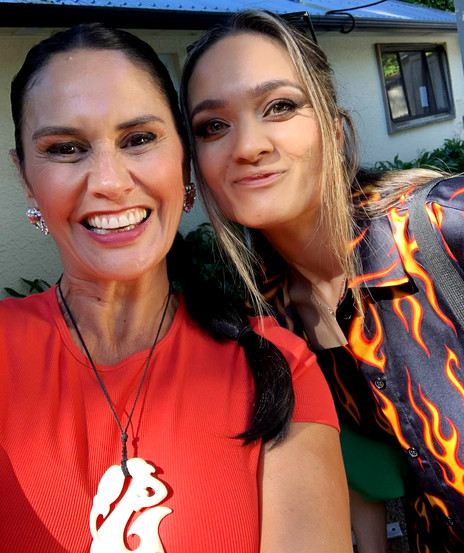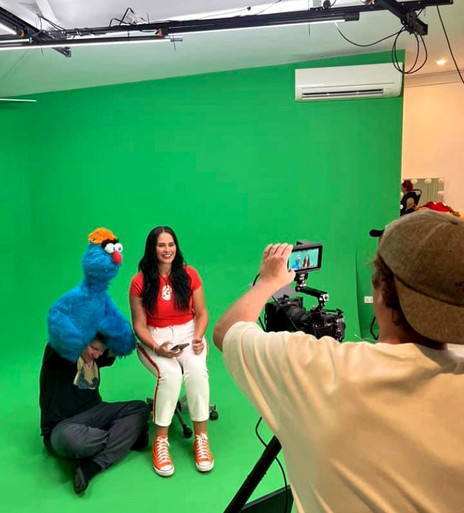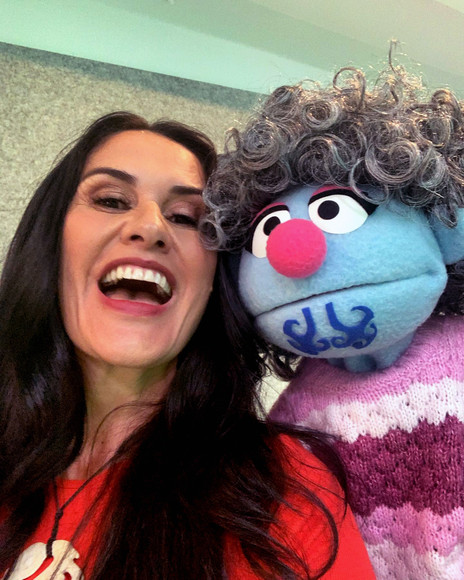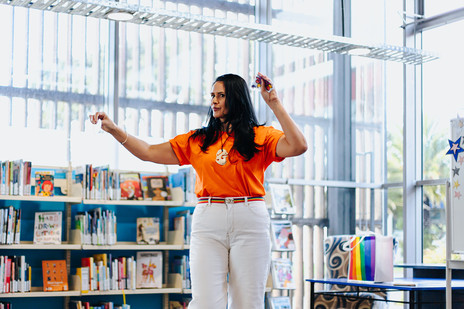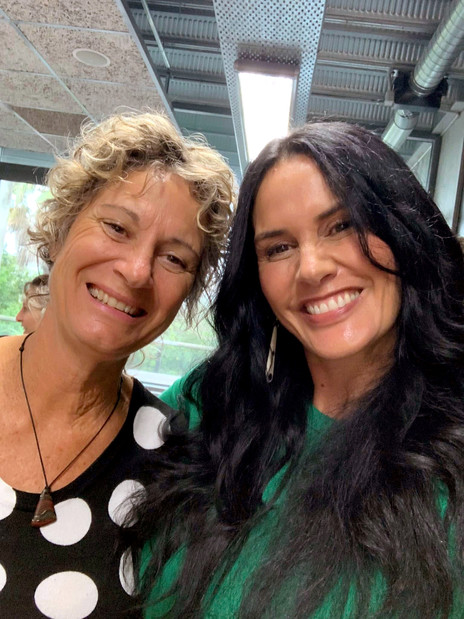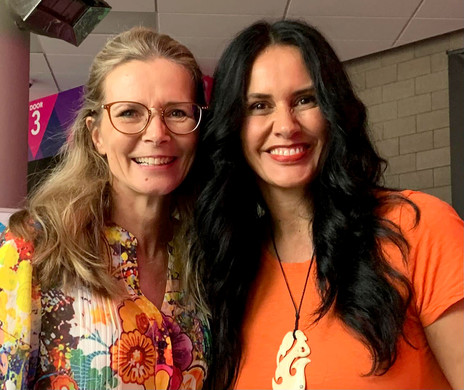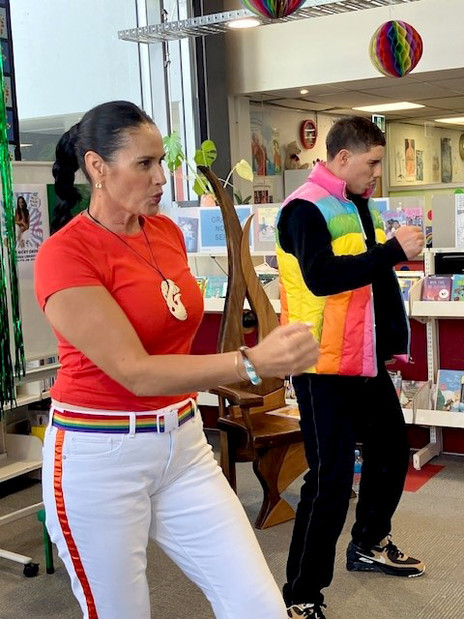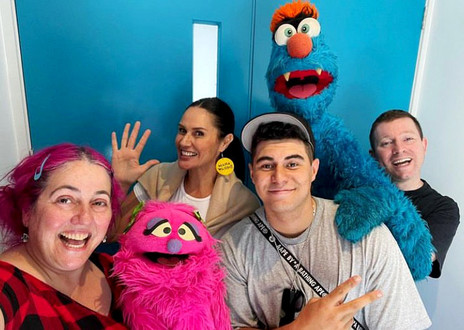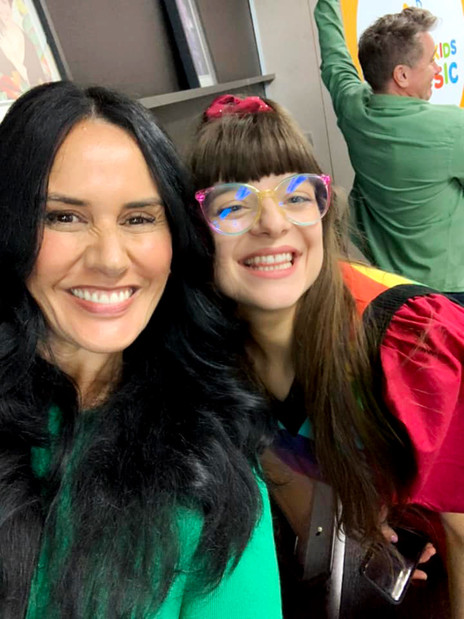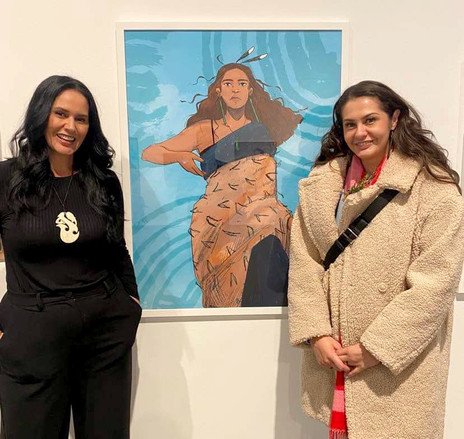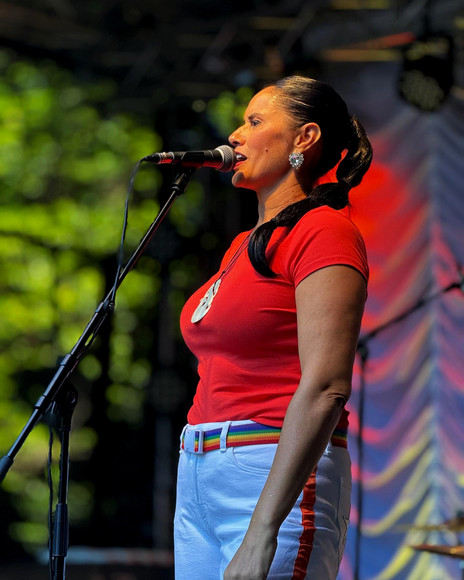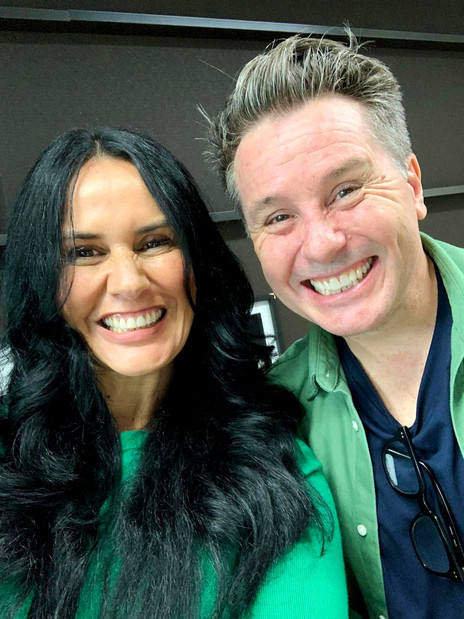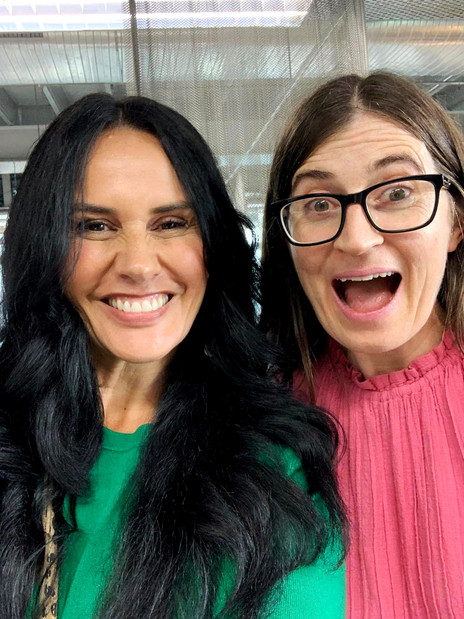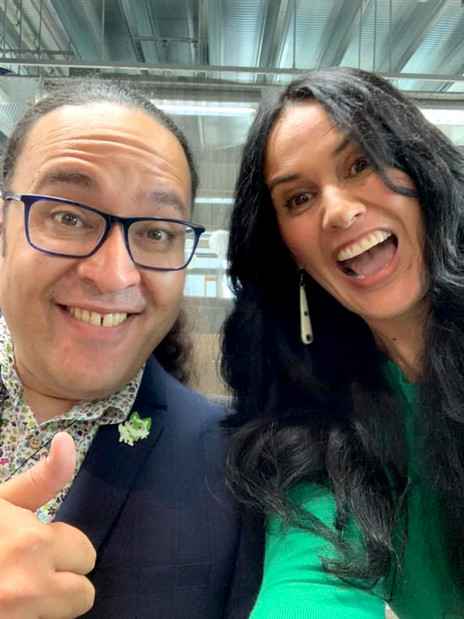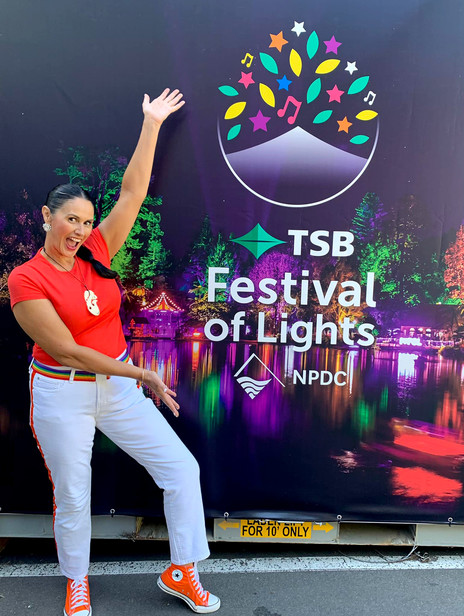The youngest of seven children, with five brothers she was a daddy’s girl, in a house heaving with boys. Her father hailed from the regal Ngāti Koata – musicians and artists he was proud to hark back to.
“My father was part of the generation who missed out on learning his reo. We didn’t speak our language and we didn’t know our culture. The only reference I had to Te Ao Māori was love, and music, and that came from my father.” It was a love that would eventually endure to outlive him, through his daughter. Nicolla always played music – piano, violin, viola, cello – and sang. She remembers a “beautiful” childhood, travelling from church to church, singing with her father.
“We would travel around to different churches, and I would tell these beautiful stories, and my father would hold up pictures to these stories. I was four years old, and I remember he used to bribe me with ice cream. But I just loved singing with my father, at church, and at community events. Music was our love language. My father would sing to me, and I would sing to him. That’s when I felt happy, when I was singing.”
“Music was our love language ... That’s when I felt happy, when I was singing.”
Like so many little girls with a song in their hearts, she had stars in her eyes.
“I did dream of stardom. I think some people are just born with it. When I reflect on the fantasies that I had when I was a child, they were always with me performing, and me being a star,” she laughs. “I remember at four years old, dancing in front of my mirror in the bedroom, fantasising that I was a USO [United Service Organizations] performer, and I would fly in on a helicopter, and perform in front of all the soldiers in Vietnam, and that my show would just please everybody, and how it was so dire, and such an important thing that I perform for everyone. Yes, I dreamed of being a performer.”
Aunty Rangi Parker, her father’s much-loved cousin, was a member of the legendary all-women Māori vocal group The Shevelles before embarking on a solo career. When Nicolla was about 14, Rangi began to show a particular interest in her niece, encouraging her to sing.
“That was sort of the first time when I might have considered, ‘Oh, maybe I can sing’. So, she sort of gave me a lot of confidence to stretch that a little bit more, because she was an entertainer.”
Even though performance was a big part of her upbringing, she never imagined it to be more than a fun dream.
Flash forward a few decades to 2020, and Nicolla is a mother of four big kids, living on Australia’s Gold Coast. She’s been performing music professionally in childcare centres for about six years, as part of a business she owns, managing performers who do educational incursion programmes in childcare centres. Then Covid hits.
“Our business shut down, like so many others,” she recalls. “So, I decided, alright, I’m gonna start a YouTube channel, because I was very concerned that our babies did not have any information. Everyone’s talking to the grownups, but I did not see anyone addressing our babies. I recognise what I’m very good at is explaining hard things to little ones. So, I started a YouTube channel, talking about Covid hygiene practices.”
Miss Nicky Says put a Māori song on her YouTube channel, and overnight it went viral
Throughout the years, she had been collecting Māori songs, with the idea that there was a gap in the market. “I didn’t really know what I was gonna do with them,” she says. Then, one day, she decided to put one of the Māori songs on her YouTube channel. “Overnight,” she recalls, “it just went viral. I thought, ‘OK, here we go. This is what I thought it would be’. I was surprised at the response. But, I thought, ‘My inkling is correct, and I need to go with this’. So, I just continued to write Māori content. Thankfully, this important thing to me was important to everyone else, and I just haven’t looked back.”
Her channel Miss Nicky Says was born in May 2021, and has had over 2.5 million views in the past three years, spawning a handful of viral hits. “My biggest hit is the ‘Matariki Macarena’ (or ‘The Nine Stars of Matariki’), which has over 700,000 views on YouTube. ‘Oma Rāpeti’ has maybe 350,000 views. I’ve got maybe 44 videos on YouTube. It’s done incredibly well. Not only that, but I’ve been the recipient of several grants, so, I’ve been very fortunate that these funding agencies also believe in my kaupapa, in my mahi, creating waiata for our tamariki. I’ve been very, very blessed.”
The Miss Nicky Says brand is a whānau affair involving all four of Nicolla’s tamariki, each of whom are artists in their own right.
“My two older daughters are artists. Lee [Solo] is a clothing designer, and very established artist, and she’s done incredibly well for herself. Story [Hemi-Morehouse] is a children’s illustrator for Māori pukapuka. My son Arama [Morehouse] is a very established performer, and audio engineer and producer too. Our baby Hemi [Morehouse – Tama G in the Miss Nicky world] is 16 and he’s still finding himself.” He can sometimes be found – resplendent in a rainbow puffer vest – rising from the crowd for a haka with his māmā on stage, or rapping with her in a music video (like the bangin’ educational hit ‘I Love Matariki’).
“My babies are involved because we’re a family … and artists like to collaborate,” she says. “So, when my arty children have projects, we all help each other. They help me too. Arama helps to produce a lot of my music. Story has illustrated a book with me called Because I’m Māori/He Māori Ahau, which is being published by Bateman Books. Lee has helped to animate some of my New Zealand On Air videos [including the first one for ‘Because I’m Māori’]. I’m very lucky. We can do all of this stuff in-house. We’re all very supportive of each other. We love collaborating. So, it is a family effort.”
The original animated ‘Because I’m Māori’ video has had 15,000 views on YouTube. The Māori lyric video has had 1.1k views, and the English one 1.4k views. Those figures are recorded a month before the book releases late May, in time for Matariki 2024, when it’s sure to hit the sweet spot in school/preschool/children’s library high rotation, come June.
“I don’t know where my songs come from. I feel like I stand on the shoulders of my tūpuna”
“I don’t even know where it came from,” Nicolla says of the hit. “I don’t know where any of my songs come from. I do feel like I stand on the shoulders of my tūpuna, and I get these major downloads of songs, and the lyrics just flow to me. I felt like it was a really important song because I want our babies to feel proud of who they are. I want our babies to feel strong and secure and confident in their cultural identity.
“I’ve been very blessed, because it’s one thing to hear it, but to see it and to read it, is very meaningful. It’s something that you can curl up with, with your loved ones, having a pukapuka. Books are like friends, aren’t they? They’re cosy and they’re comforting. So, to have a song become a book, is really such a privilege. It’s something I never imagined for myself. It’s beyond my wildest dreams. I feel incredibly grateful.
“Besides the cultural values that are depicted in the song and in the words and in the pictures, you can feel love, and that’s important, because I think that’s something that every culture can understand. That is definitely my deepest understanding of Te Ao Māori – love, and then waiata. I think it comes at a great time, before Matariki, when we’re celebrating all things Māori, where we’re celebrating our Māori new year, so I hope that families and educators can buy this book to celebrate our values.”
It was the experience of not finding much in the way of strong Māori content for her own tamariki, when they were young, that instilled the desire to write material she wished they had access to. She also writes for babies not born yet.
“I do write for my mokopuna. I don’t have any at the moment, but I do create content that I want mokopuna to see. I write content for my future whakapapa. I really think it’s important for our babies, our tamariki, to see themselves in the media. If they don’t find someone who looks like them, and who understands their cultural values, they’ll go somewhere else, and we lose our babies to the mass of stimulating content on YouTube.
“That’s why I really feel it’s important that I show our babies who they are. We learn so much from waiata: we learn about our cultural values, we learn our language, we learn about who we are, where we come from, and that’s why I do what I do. I feel so strongly about it. It’s not just me goofin’ around having a good time, it’s actually a heavy burden that I carry …” She closes her eyes and puts her hands to her heart, to indicate precisely where she is carrying it, “... because I do feel the value, and the weight and the importance of it, and the responsibility of doing it well.”
On stage and at photo ops – in her orange T-shirt, bright white jeans, and rainbow belt, always engaging and smiling – Miss Nicky exudes a positive vibe ngā tamariki are magnetically drawn to. But there’s a gravity behind the engaging bedazzlement many may not discern.
“A lot of children’s artists are very bubbly and bright and crazy,” Nicolla says. “I struggle with that, because I want to fit into the scene, but I don’t wear that hat, because I actually do feel the responsibility of our tūpuna. I do wear this hat very carefully. I do think it’s a big responsibility to support and represent our babies, and our culture. And our culture also comes from a place of struggle, and it’s sometimes a heavy burden to carry.
“our culture comes from a place of struggle ... sometimes it’s a heavy burden to carry”
“So, Miss Nicky comes off as all bright and beautiful and lovely and magical” – she illustrates this idea with jazz hands – “but I think what people wouldn’t understand about Miss Nicky is, me as a person and a songwriter, as a creator, it’s a heavy place, and so I carry this responsibility very carefully, and I also acknowledge that my songs and inspiration come from something greater than myself. I stand on the shoulders of our tūpuna, and I feel very, very blessed for that. If I’m the waka to bring these waiata forward, then so be it. But I also do feel – you know, my father passed a few years ago – I do feel that he’s sharing his songs with me, and it’s a very sobering thing too. I’m very grateful, I feel very blessed.”
While she admits that making music ideally suited to an Aotearoa context is somewhat at odds with its creator being domiciled across the pond, the Miss Nicky brand is in hot demand at home, bringing her back more and more frequently these days.
“I also recognise, too, that our tamariki are not just in Aotearoa,” she points out. “Our tamariki are everywhere. We have a strong demographic and contingencies of Māori people living here in the Gold Coast. So, we have to remember that when we make content, we have to reach all of our babies. When I get a bit mokemoke, and I wanna go home, and I’m feeling a bit useless here, I remind myself that our babies are everywhere. That is the beauty of having YouTube, because social media goes worldwide. It’s a great time to be a YouTuber, because there are audiences everywhere.
“Having said that, I will be going home eventually, and I’m looking forward to growing my brand even more when I do. It’s a conflict, but I make it work, and that’s the best I can do. I’m lucky too, I’ve been able to go home a few times for festivals and performances, and I’ve got some big Suzy Cato shows coming up in June that I’ll be doing, a big Matariki party concert too, there in Auckland. I’m very lucky because Miss Nicky keeps me going home, keeps me relevant at home. It’s a great waka to keep me grounded.”
